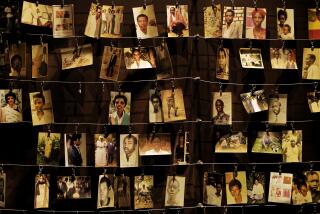For Clinton, Mideast Hills Are Alive With Allegory
- Share via
JERUSALEM — In this corner of the world, the story of Masada carries the emotional weight the Alamo does in Texas.
As legend has it, Jewish zealots besieged by the Roman army nearly 2,000 years ago (AD 73) atop a mountain above the Dead Sea chose death rather than surrender. Thus was born a cultural symbol: the inspired fight of the weak against the strong, of death before enslavement.
As he flew home to face siege by House Republicans, President Clinton could be excused for identifying with the population of Masada--967 men, women and children trying to fend off the army of Flavius Silva, about 10,000 to 15,000 strong. They chose what was perhaps the ancient equivalent of resignation. He has vowed not to quit.
The puffiness under his eyes notwithstanding, Clinton labored to project the air of a man with nothing on his mind beyond the welcome challenges of his office. After all, this is an executive said by aides to have a remarkable ability to deal with the many pressing elements of his job separately.
Was he able, a reporter asked, to insulate the Middle East peace process from the domestic political problems he--and Israeli Prime Minister Benjamin Netanyahu--are facing?
“Oh, absolutely,” the president replied, projecting a broad grin and a relaxed, aw-shucks attitude that as much as asked why anyone would think otherwise. “You show up for work every day. It’s not a complicated thing.”
So the president of the United States, on the final day of his three days in the Middle East, was making one last stab at finding peace between Netanyahu and Palestinian leader Yasser Arafat and then playing tourist at Masada with the Israeli as his guide and before that in Bethlehem, where the Palestinian was his host.
At Manger Square, the president, First Lady Hillary Rodham Clinton, their daughter, Chelsea, and Arafat and his Christian-born wife, Suha, now a Muslim, visited the Church of the Nativity, entering through the Door of Humility. The church is built over the grotto where Jesus is said to have been born. The Clintons hung ornaments on a Christmas tree. The president joined in while a choir of perhaps two dozen children sang “Joy to the World.” He threw an arm around his wife’s shoulder. Everyone smiled.
More than once during the trip, Clinton applied a biblical cast to the search for peace in the Middle East that could be applied equally to his own search for a degree of peace with his critics.
“In the Christian New Testament,” he said, “we are instructed that they who judge without mercy will be judged without mercy, but mercy triumphs over judgment.”
But in this land of ancient parables, there is another one, more recent than that of Masada, that may be just as disconcerting to the White House.
On Monday, Clinton visited Gaza, where more than 1 million Palestinians live in impoverished refugee camps and other shantytowns.
He flew over the crowds by helicopter. But the people, once hostile to American leaders, nevertheless turned out to greet him. They lined an anticipated motorcade route, displaying banners welcoming him and waving U.S. and Palestinian flags.
On June 13, 1974, as the Watergate crisis neared its climax, Richard Nixon traveled through the Middle East. By train, he journeyed along the Nile to Alexandria, with Anwar Sadat, president of an Egypt once hostile to the United States, at his side. Thousands of people lined the route, cheering an American leader who was embattled at home.
Seven weeks later, Republican Sen. Hugh Scott of Pennsylvania, the minority leader, led a delegation of Republican senators to the White House to tell the president that his support had evaporated.
The senator told a reporter immediately afterward: “Nixon sat there with his feet up on the desk and behaved like a man who didn’t have a care in the world.”
The day after Scott and his delegation visited the White House, Nixon resigned.
More to Read
Sign up for Essential California
The most important California stories and recommendations in your inbox every morning.
You may occasionally receive promotional content from the Los Angeles Times.













